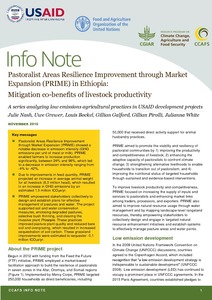Resource information
Pastoralist Areas Resilience Improvement
through Market Expansion (PRIME) showed a
notable decrease in emission intensity (GHG
emissions per unit of meat or milk). PRIME
enabled farmers to increase production
significantly, between 24% and 96%, which led
to a decrease in emission intensity ranging from
-4% to -42%.
? Due to improvements in feed quantity, PRIME
projected an increase in average animal weight
for all livestock (8.3 million head), which resulted
in an increase in GHG emissions by an
estimated 1.5 million tCO2e/yr.
? PRIME empowered stakeholders collectively to
design and establish plans for effective
management of pastures and water. The project
supported soil and water conservation
measures, enclosing degraded pastures,
selective bush thinning, and clearing the
invasive plant Prosopis. These practices
improved pasture plant quality and reduced bare
soil and overgrazing, which resulted in increased
sequestration of soil carbon. These grassland
improvements were estimated to sequester -0.1
million tCO2e/yr.


